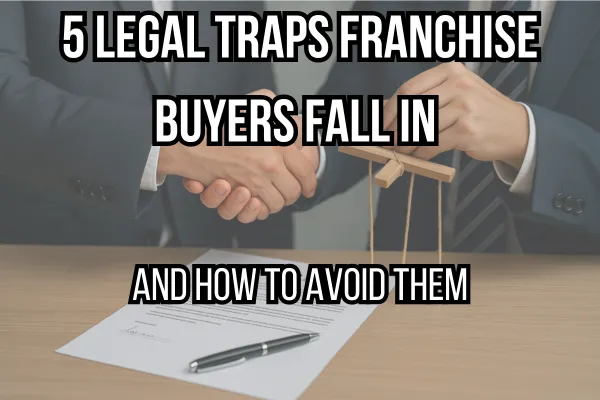
5 Legal Traps Franchise Buyers Fall In (and How to Avoid Them)
5 Legal Traps Every Franchise Buyer Must Avoid
How to protect yourself before signing the franchise agreement
If you're serious about buying a franchise, understand this: the biggest mistakes are made before you ever open your doors. Once you sign a franchise agreement, you’re locked into a legal relationship that’s heavily weighted in favor of the franchisor. Smart buyers dig deep into the Franchise Disclosure Document (FDD), ask tough questions, and negotiate key terms upfront. You may not be able to change the royalties, but there are a number of other key areas that are up for negotiation.
Here are the five legal areas where most franchisees get burned—and how to avoid joining that list.
1. Item 19 Hype ≠ Reality
Franchisors are not required to disclose financial performance data, but if they do, it's in Item 19 of the FDD. Many buyers see this section and assume they’re being shown typical earnings. They’re not. Most Item 19s reflect handpicked data—often from top-performing franchisees, corporate locations, or stores in low-cost markets.
In most instances, franchisors provide only gross revenue data, omitting costs entirely. That number is meaningless unless you know how much it costs to operate the business.
You will also see numbers for franchisees who have been in business a certain number of years before they are reported so you still won't know what the first year or two looks like on average.
What to do: Ask franchisees what they earn—not what the FDD says. Build your own pro forma. If you can’t model a path to profitability based on real-world inputs (and with your required salary included), walk away.
2. Territory Protections Are Often Paper-Thin
Many franchise buyers assume they’ll get an exclusive territory, but that’s rarely the case—especially in home services or mobile businesses. Even if the contract says “exclusive,” it may still allow the franchisor to sell products online, service customers directly, or award licenses to sister brands in your area. The franchisor may tell you that will only happen if you are underperforming, which is fine as long as you have it in writing.
If they own other, similar franchised businesses then this could be a red flag for conflict of interest (ie. two oil change franchises). However, if they own tangential businesses (ie pest control and landscaping) then it could be a great opportunity for referrals and cross branding.
What to do: Read Item 12 line by line. Confirm:
Is your territory truly exclusive?
Can corporate still make sales in your area?
Are leads assigned by ZIP, radius, or not at all?
If it’s vague, that’s intentional. Nail it down in writing, or be ready to compete with your own franchisor.
3. Termination and Renewal Clauses Are Brutal
Franchise agreements often let the franchisor terminate you for minor infractions—and give them broad discretion to deny renewal at the end of your term. Many buyers don’t realize that even after a decade of hard work, the franchisor might say: “Thanks for your service, we’re taking this unit back now.”
What to do: Check Item 17 and ask:
Can I renew automatically if I meet certain benchmarks?
What counts as a breach?
Do I get a chance to fix problems before termination?
Are there any limits on non-competes after I leave?
If your exit rights aren’t clearly spelled out, you don’t have them.
4. Vendor Kickbacks and Supply Restrictions Inflate Costs
Item 8 of the FDD discloses whether you’re required to buy from certain suppliers—and whether the franchisor makes money on those sales. Some franchisors quietly mark up your required inventory or equipment while collecting hidden rebates. Over time, this can destroy your margins.
What to do: Ask current franchisees:
Are the required products fairly priced?
Can you use alternate suppliers?
Have costs gone up unexpectedly?
If franchisees are being squeezed on supply pricing and can’t negotiate, that’s a big red flag.
5. Legal History and Hidden Disputes Matter More Than You Think
Item 3 lists prior lawsuits involving the franchisor, but it’s just a snapshot. Some cases are ongoing, quietly settled, or filed after the latest FDD update. Franchisors who frequently sue their own franchisees—or have been sued for fraud, misrepresentation, or unfair practices—should give you pause.
What to do:
Google “[Franchise Name] lawsuit”
Search PACER or state court records
Call former franchisees listed in Item 20
Ask: Why did you leave the system? Sometimes, what’s not disclosed is what matters most.
Final Thought
Franchise law doesn’t exist to protect you. It exists to enforce the contract. That means your only shot at a fair deal is before you sign.
So read the FDD like a lawyer. Ask uncomfortable questions. Talk to franchisees. Get every promise in writing. And hire a franchise attorney who’s seen hundreds of these deals.
Franchising can be a great path to ownership—but only if you go in with eyes open.
